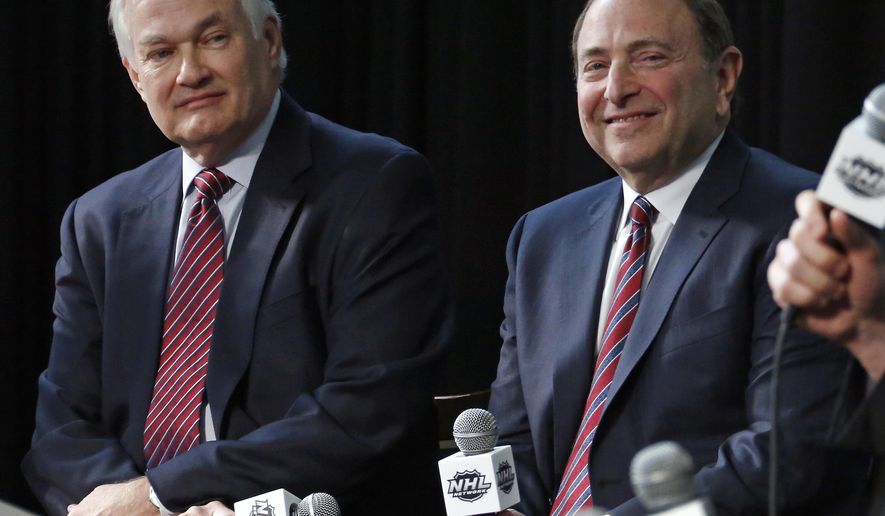
'A step toward normalcy' - NHL shapes a return to play plan
by JOHN WAWROW and STEPHEN WHYNORosy as the news might sound, Gary Bettman made no promises in announcing the NHL has the framework of a plan in place to return to the ice.
“We hope,” the commissioner said, “that this is a step back toward normalcy.”
The league and its players overcame a significant hurdle Tuesday when Bettman formally unveiled a 24-team expanded playoff format in which games could start as early as late July in two yet-to-be-determined cities.
The plan - as with anything involving forming a timetable around the coronavirus pandemic — comes with no certainties.
“Obviously, there are lots of things to be done,” Bettman said, noting health and safety come first. “But this marks a very important step along the journey that we’re undertaking.”
Under the plan, the top four teams in each conference have already qualified for the round of 16, and will play a round-robin tournament to determine seeding. The remaining eight teams in each conference will be seeded and take part in best-of-five series to determine the remaining playoff teams.
The NHL might be ahead of Major League Baseball and the NBA in terms of when and how it might return to action, but numerous questions remain before a puck is dropped in a meaningful game for the first time since hockey was put on pause in March.
“You have to do these in a sequence. You have to prepare for what we hope is going to be a consensus that we can and should play,” NHL Players’ Association executive director Don Fehr told The Associated Press. “This is but a meaningful start, I think. But it’s only a start.”
Timing is an issue. The NHL projects players might be allowed to begin returning for voluntary workouts next week.
Another concern is how long it might take players, including the dozens who have spent the past few months with their families overseas, to return to their home cities and whether they will have to spend two weeks self-quarantining upon their return. There might be a solution for that.
“We’ve reached an understanding with the Canadian government that players can cross the Canadian border as well both internationally from overseas but also from the United States so they can return to their home city without problem,” Deputy Commissioner Bill Daly said.
The next phase will feature a roughly three-week training camp starting no earlier than July 1. The league hopes all 24 teams are cleared to hold full practices based on local health regulations.
There are also outstanding questions on health and safety protocols, and determining which two cities will serve as hubs. Bettman announced the NHL has narrowed the list to 10: Chicago, Columbus, Ohio, Dallas, Las Vegas, Pittsburgh and Minneapolis/St. Paul in the U.S. and Edmonton, Toronto and Vancouver in Canada.
Should all those issues be resolved, the NHL can then proceed with playing games.
On the bright side, the NHL still has time on its hands in the event of needing a contingency plans, with Bettman saying the 2020-21 season could start at late as January.
“If it has to slide more, then it’ll slide,” Bettman said, referring to the timetable. “There’s a reason that we’re not giving you dates now because anybody who gives you a date is guessing, and we think we’d rather take a more holistic approach to doing this.”
Hockey is benefiting from what’s been an effective and collaborative approach conducted by its Return to Play committee, which features player and league representatives. The committee not only proposed the 24-team format, but also devised a list of protocols for teams to follow once players return to their facilities.
Teams will be responsible for testing players during workouts and training camp, with the league taking over when games begin.
Daly said players would be tested for COVID-19 daily and he added that medical advisers contend, for now, “that one single positive test depending on the circumstance should not necessarily shut the whole operation down.”
“Obviously we can’t be in a situation where we have an outbreak, and that will affect our ability to continue playing,” Daly said. “But a single positive test or isolated positive tests throughout a two-month tournament should not necessarily mean an end to the tournament.
The decision to call off the 189 regular-season games that were not played ends the season for Buffalo, New Jersey, Anaheim, Los Angeles, San Jose, Ottawa and Detroit.
Those seven teams will now prepare for one of potentially two draft lotteries to determine the top 15 selections. The lottery will be held June 26, with another scheduled later depending on which of the remaining eight teams qualify for the 16-team playoff.
Sabres co-owner and president Kim Pegula said the emphasis was placed on completing the season and ensuring the Stanley Cup will be awarded, even if it came at Buffalo’s expense. The Sabres extended their playoff drought to a ninth season, finishing just behind Montreal.
“We’re all trying to find that right chord, what’s best for the league,” Pegula told The AP. “It’s one of those times when you’ve just got to look at it that way.”
AP Sports Writer Dave Campbell contributed.
For more AP NHL coverage: https://apnews.com/NHL and https://twitter.com/AP_Sports